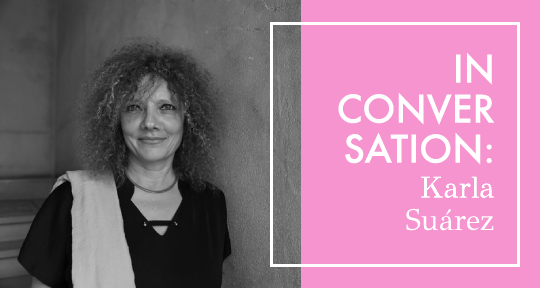As I coordinated this interview with Karla Suárez, I had the impression that she was in constant motion. She is an inveterate bike rider and, even while working, takes “virtual trips by pacing around [her] writing table.” Her abundant energy is evident both in her productive career (nine books and participation in no less than forty-two anthologies during the last decade and a half) and in her female characters, canny women who are the architects of their destinies.
For Suárez, the mind’s attempt to understand is best complemented by a strong dose of the physical, because the body offers its own truths: “The best thing to do is to make love,” declares brainy Julia, the protagonist of Havana Year Zero. “. . . not think, offer up the body, the body, the body, the body, to the point of exhaustion . . . and the next day another body, and not thinking, not thinking, not thinking.”
Suárez’s background as an electrical engineer and a classical guitarist is evident in her novels which have the timing, complexity, and structural elegance of the proverbial Swiss watch. She likes her chapters to be about the same length to offer the reader rhythmic consistency, and intertextual gems await the attentive reader. But she is also something of an imp. She likes to have fun—and so do her characters.
I started our interview with word association, just as friends Lucía and Circe do in Suárez’s second novel Viajera, and she played right along. Then we talked about writing about home through the twin lenses of time and distance.
— Dorothy Potter Snyder
Dorothy Potter Snyder (DPS): Let’s play word association.
Karla Suárez (KS): Okay.
DPS: City?
KS: Should have an ocean.
DPS: Ocean?
KS: Motion.
DPS: Body?
KS: Sweat.
DPS: Stranger?
KS: What I am sometimes.
DPS: People call you a Cuban writer, but above all you’re an urban writer, whether the setting is Havana, Mexico City, Sao Paolo, Rome, Paris, or Lisbon where you live now. Can you imagine writing a novel that doesn’t have anything to do with a city? Or are they—and Havana in particular—indispensable to you?
KS: Four novels (Silencios, La viajera, Habana año cero, El hijo del héroe) compose what I call “my Havana Symphony,” because the characters in them are either from Havana or live there. In those novels, I wanted to deal with themes that concern the country and the city where I was born and raised, a Havana that goes from the 1970s to the ’90s. They are independent stories, of course, but there are subtle links between them. For example, some secondary characters appear in more than one novel; there are scenes in which the protagonists of several novels meet without knowing each other; and there is an object (a backpack) that passes from one character to another and thus travels from novel to novel. I wanted to create a micro-world where my characters cross paths—and even I with them, because I also appear in a very subtle way (though not as a protagonist) in some of these stories. This symphony is now complete, and I’ve started another cycle. The story I’m writing now, for example, does not take place in Havana nor does it have anything special to do with the city. It’s part of a different symphony. READ MORE…

